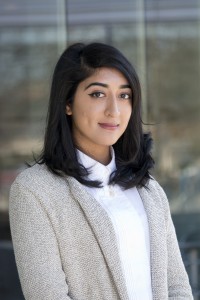
Sara Khan (photo by Kristen Chavez)
When Sara Khan ’16 was a teenager, her grandfather told her a story that planted the seeds for her passion for medicine and global health. An obstetrics/gynecologist friend had treated a Pakistani woman who had experienced multiple miscarriages.
The doctor said, “Don’t worry, I’ll take care of you.” He gave her what she thought was “medicine,” with instructions to take one pill a day with a cup of lassi, a yogurt drink. “If your family says, ‘No, you can’t do this,’ tell them I told you to do this.”
Before long, the woman carried her baby to full term. The pills? Simple prenatal vitamins.
“When he told me about this woman’s story, I said, ‘I need to be a part of this,’” recalled Khan, a senior with a double major in global studies and biology and a minor in chemistry.
Medicine runs in the family for the Burlington, N.C., native, whose parents are of Pakistani descent. Her father is a cardiologist and her mother an internal medicine physician. Khan has applied to medical school and masters programs in public health and medical anthropology.
Growing up, Khan went to Pakistan almost every summer and spent a lot of time in South Asia. In 2015, she was named a Phillips Ambassador and studied abroad through the UNC Summer in India program. Her original goal was to document border conflicts and animosity in India and Pakistan.
Khan began to get footage for a documentary about people’s experiences on each side during the daily ceremonial flag raising and lowering at the Wagah border. But her time there was limited, so she hopes to continue the project in the future. Instead, she helped to organize a workshop at the FedEx Global Education Center for students, particularly women of color, who are interested in studying abroad in Asia.
For Khan, global studies’ interdisciplinary programs have been the perfect place to better understand topics like structural violence, accessibility to health care programs and social determinants of health.
“UNC’s global studies department has really nurtured me and given me the tools, motivation and encouragement to pursue all of my passions,” Khan said.
Khan is publicity chair for the UNC Muslim Students Association, co-editor of Monsoon, a South Asian student magazine, and a volunteer at the Women’s Health Information Center at UNC Women’s Hospital.
In her honor’s thesis she’s studying the framework by which intervention programs are developed and established, specifically those related to empowering women in the developing world. She is trying to understand the interactions between feminist theory, development programs and women on the ground.
“It’s all about understanding development economics — how do we decide what a viable intervention program is, and who gets to decide that?” Khan explained.
Last summer, Khan was in Pakistan to interview administrators of low-income government and private schools in Lahore about obstacles to menstrual health education (MHE). MHE is a complex example of a program that could empower young girls and improve school enrollment or dropout rates. Khan is using MHE as a case study in a broader narrative on successful intervention programs.
Khan said there’s nothing more intriguing than tackling complex issues like this.
“That’s one of the reasons I love global studies so much,” Khan said. “Because it’s an interdisciplinary degree- you learn about issues from multiple perspectives. You realize nothing is black or white — everything is gray. And unpacking the grayness is what I really love to do.”
By Pamela Babcock
Read a Daily Tar Heel Q&A with Sara Khan.
